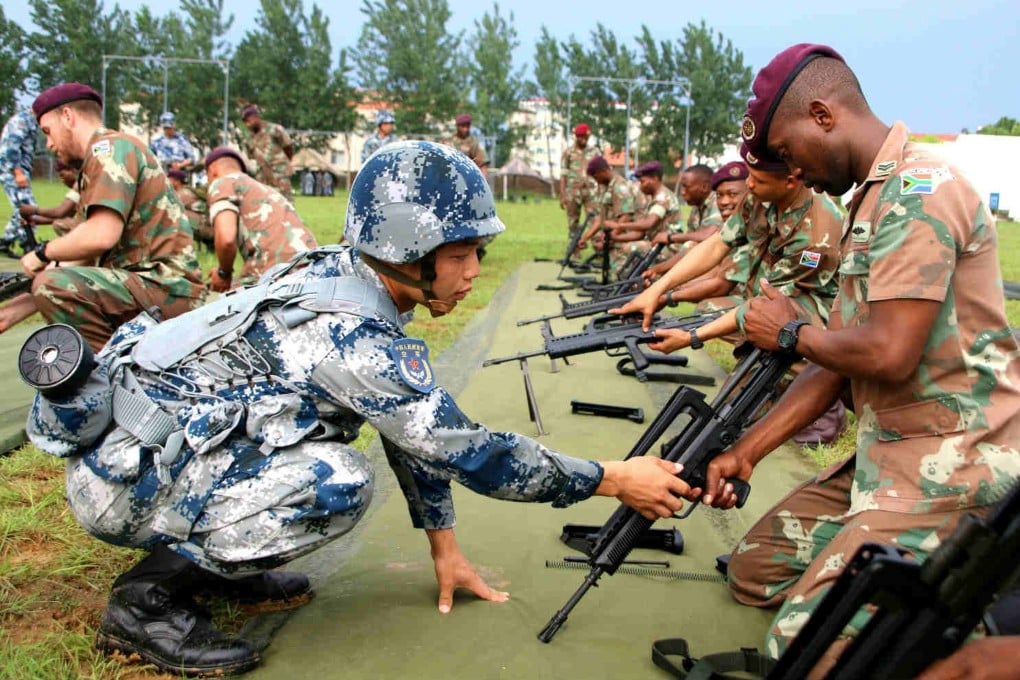 China’s expanding military footprint in Africa has drawn increasing concern from the United States, as Beijing deepens its engagement with African nations through arms sales, military training programs, and strategic aid packages. U.S. officials and defense analysts have raised alarms over what they see as a growing effort by China to build long-term influence on the continent, potentially shifting the balance of power and limiting Western influence in key regions.
China’s expanding military footprint in Africa has drawn increasing concern from the United States, as Beijing deepens its engagement with African nations through arms sales, military training programs, and strategic aid packages. U.S. officials and defense analysts have raised alarms over what they see as a growing effort by China to build long-term influence on the continent, potentially shifting the balance of power and limiting Western influence in key regions.
Over the past decade, China has steadily expanded its military relationships with several African countries. While much of its earlier focus was on infrastructure development and economic partnerships through the Belt and Road Initiative, recent years have seen a marked increase in defense cooperation. Chinese arms exports to Africa have surged, with countries such as Nigeria, Tanzania, Ethiopia, and Zimbabwe purchasing a range of military hardware, including drones, armored vehicles, naval patrol boats, and small arms.
In parallel, China has ramped up military training programs for African officers and troops. These training initiatives are often hosted both in Africa and in China, and are framed as opportunities for capacity building, peacekeeping readiness, and strategic partnerships. China has established defense attaché offices in numerous African capitals and continues to participate in joint military exercises, peacekeeping deployments, and counterterrorism exchanges with various African militaries.
While Beijing maintains that its military engagement in Africa is driven by peaceful intentions, such as supporting stability, fighting piracy, and assisting with peacekeeping efforts, Washington remains skeptical. Senior U.S. defense officials have expressed concern that China’s growing defense relationships could be used to secure access to critical infrastructure, such as ports and airfields, which might one day serve military purposes.
These concerns were heightened by China’s establishment of a military base in Djibouti in 2017—its first overseas base—situated near a major U.S. base and key global shipping lanes. Since then, U.S. intelligence has tracked reports of China exploring the possibility of additional military outposts along the west and east coasts of Africa. Locations in countries like Equatorial Guinea, Angola, and Tanzania have been highlighted as potential future sites for Chinese military expansion.
American officials argue that China’s defense presence could erode democratic institutions by empowering authoritarian regimes and undermining human rights norms. They also point to the opaque nature of many Chinese military agreements, which often include arms-for-resources deals or financial assistance tied to strategic concessions.
In response, the U.S. has begun reinforcing its own military partnerships on the continent. This includes increased engagement with African regional security forces, new defense training programs, and continued support for peacekeeping and counterterrorism operations, particularly in the Sahel and Horn of Africa regions. American diplomats have also stepped up efforts to warn African leaders about the risks of deepening military ties with Beijing, including concerns over debt, surveillance technology, and data security.
Some African leaders, however, reject the notion that China’s military cooperation is inherently threatening. They argue that African states have the sovereign right to choose their defense partners and that China’s support is often less conditional and more responsive than that offered by Western countries. In interviews and public forums, several African defense ministers have praised China’s willingness to provide equipment and training without what they see as excessive political interference.
Analysts say the competition between the U.S. and China in Africa’s military space reflects a broader geopolitical rivalry that extends beyond the continent. As both nations compete for global influence, Africa’s strategic importance—due to its growing population, natural resources, and geopolitical positioning—is increasingly at the center of defense and foreign policy agendas.
While U.S. and Chinese officials have occasionally cooperated in Africa, such as in anti-piracy missions in the Gulf of Aden, tensions over military intentions continue to grow. American lawmakers have called for more comprehensive strategies to counter China’s influence, including increasing defense funding, promoting democratic values, and bolstering alliances with African nations.
As China continues to deepen its military engagement with Africa, the implications for global security dynamics remain uncertain. For African countries, the challenge lies in navigating these competing powers in ways that prioritize sovereignty, development, and long-term stability.

